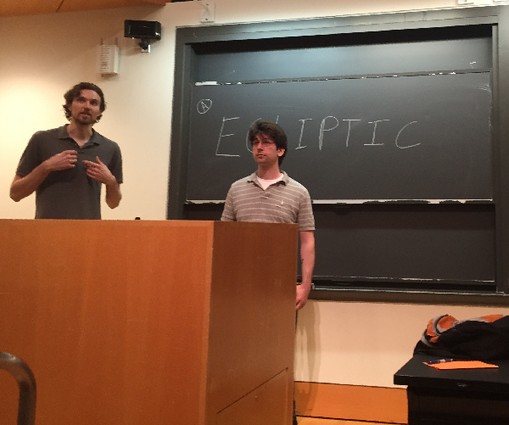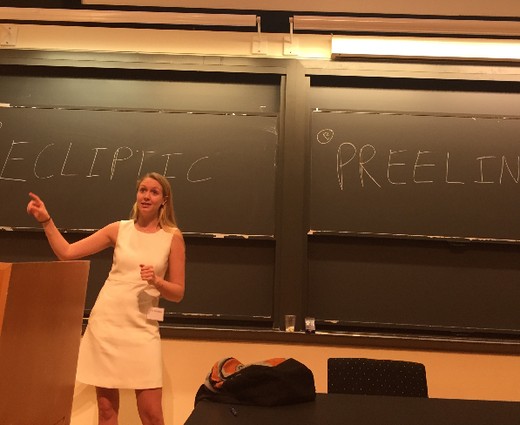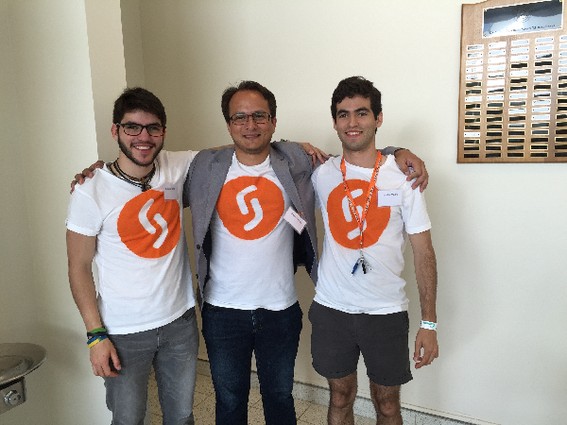Princeton Alumni, Students Shine at Princeton Entrepreneurs’ Network Demo Competition
For the past 18 years, Princeton University’s Princeton Entrepreneurs’ Network has invited some of its most creative and innovative student and alumni entrepreneurs to demo their latest startups.
On May 29, during the university’s three-day reunion, both current and former students presented their businesses, 40 in all, vying for a chance to win $70,000 in cash and services.
Of the 40 business, three were chosen to pitch their ideas to a panel of Princeton alumni with entrepreneurial experience. The three startups that advanced to the final round were Ecliptic, PreeLine and Shuflix. After the pitches, the judges chose PreeLine as the winner of the grand $70,000 prize. Shuflix won the $1,000 People’s Choice Award.

Ecliptic Industries (Philadelphia)
Jason Bennett, ’15, and Matt Plasek (Princeton master’s, ’13), founders of Ecliptic Industries, sought to disrupt a market that affects 90 percent of the manufactured goods in the world. Having worked in manufacturing, the duo saw an opportunity to cut production costs in half by streamlining the delivery of patterns to foundries that use 3D printers.
Their patterns are full-scale replicas of objects to be cast by foundries for mass production. Each pattern is used to prepare cavities into which molten material is poured. Patternmakers design the product and send the plans electronically to the foundry.
Bennett said that there is a “serious shortage of skilled labor,”as most patternmakers are “near or at retirement, or dead,”resulting in higher prices and longer lead times. Ecliptic’s technology enables a $3,000 printer to create patterns as if it were a $200,000 printer; and the company delivers the patterns in 10 days, rather than the five weeks it takes their competitors.

Preeline (New York City)
Julia Macalaster (’12), of PreeLine, observed the “fast fashion” trend and believed that she could do it better. Her company appeals to fashion-focused customers by offering them the chance to see merchandise, and validate future trends with their friends, before the merchandise hits the stores. The PreeLine website engages with early adopters, leveraging their desire for social validation from peers, by tracking the popularity of items. PreeLine also helps the brands, indicating which pieces of merchandise will be popular in a given season, and where they will sell; it also offers profiles of their customer bases, with back-end tracking tools.
Macalaster said that brands create merchandise six to 18 months before it goes on sale, but they only start to engage with customers less than a month before an item appears on the store shelves. The idea for the company emerged when one of her cofounders, David Lamer, former president of Lambertson Truex, was approached by online discount retailer Gilt Groupe, which offered to sell Lambertson Truex post-season merchandise at a discount. Instead, Lamer thought, why not promote future-season samples on the site, and see what customers respond to the most, rather than debating with his board and his sales team about future merchandise?

Shuflix (San José, Costa Rica)
Brothers Sergio, Rolando and Javier Masis (’13), make up the team behind Shuflix, an app that recommends local eateries and activities based on “diversity, originality and spontaneity.”Using APIs from other ratings and review services, recommendations from family and friends and past experiences, Shuflix will suggest places and events that the user wouldn’t have known to search for.
Once the user selects an activity type, radius and time, the recommendations are presented randomly, not based on probability, with the most relevant results listed at the top. “Random makes it simple, random means diversity, random can lead to adventure,”Javier said.
Established recommendation engines like Google and Amazon base their results on what they think you will like the best. “That might be OK for some people,” said Javier. “But if you want to try something different, the [recommendations] box that is around you prevents you from doing that very easily.”

